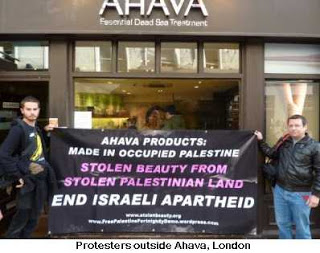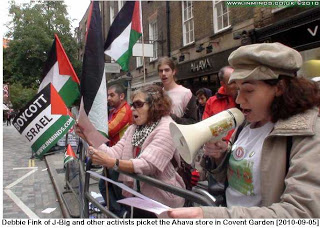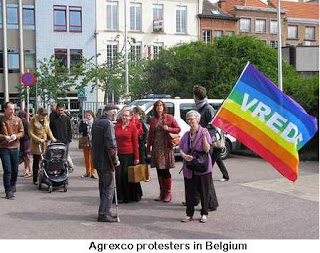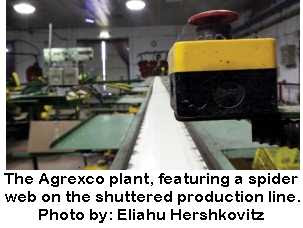



 A Double Whammy – Ahava, London & Agrexco Bite the Dust
A Double Whammy – Ahava, London & Agrexco Bite the Dust
When J-Big, (Jews for Boycotting Israeli Goods) began the protests over two years ago, we little thought that we would be successful in closing a shop whose trade was in stolen goods. Yet for two years there has been a constant picket every Saturday from 12.00-2.00 (more recently we have gone to a nearby Tescos at 1.00).
The Zionists, led by one Jonathan Hoffman, decided on a counter-protest which was probably the biggest mistake that could have been made as it helped us galvanise our own numbers and in the process caused the very disruption, barriers etc., that led to fellow stores putting pressure on the landlord to get rid of this unwanted tenant.
This was a collective effort from Palestine solidarity activists, many of whom kept coming for much of the whole two years. Others like myself turned up from time to time. Special mention should be made of Michael Shanahan and Bruce Levy (‘the Jew Levy’ in Hoffman’s anti-Semitic turn of phrase). The Zionists became so desperate at one point that they began having what amounted to a joint counter-demonstration with the fascist EDL which landed Hoffman in more trouble when he was snapped dancing down the street with the leader of EDL’s Jewish Division Roberta Moore. When he accused the photographer of ‘photoshopping’ he was forced into a grovelling apology on the Jewish Chronicle site.
Other wonderful ideas from the Zionists included ‘buycotts’, which largely meant the Zionist counter-demonstrators dipping into their pockets to buy something! Suffice to say this didn’t improve sales much! Ageing Christian Zionist demonstrators from Wales. An interesting feature of recent counter-demonstrations is the presence of Christian Zionists whose support for Zionism and Israel is predicated on Revelations, whereby in the glorious battle of Armageddon, the Jews will be destroyed except for the chosen few who will ascend to heaven in the rapture!
The good news about Ahava follows on from the bankruptcy of another seller of stolen goods, Agrexco.
Below are 3 reports from the on-line site of Israel’s mass daily, Yediot Aharanot on Ahava’s difficulties, the effect of the Boycott and a further 2 articles, from the BDS National Committee and Electronic Intifada on the Liquidation of Agrexco, the main marketting organisation for stolen West Bank produce.
Tony Greenstein
Yaniv Halily 22 September 2011
LONDON – The London branch of Israeli cosmetics company AHAVA, which has attracted many loyal buyers over the years, has also become the center of mass pro-Palestinian protests, prompting the company’s management to give in and shut it down.
The Dead Sea is considered one of the State of Israel’s most remarkable symbols worldwide. The AHAVA company has been taking advantage of this unique branding for years, with skincare products made of mud and mineral-based compounds from the Dead Sea.
The company’s link to Israel, however, became the greatest difficulty AHAVA has been forced to deal with in the past two years. Dozens of pro-Palestinian activists have been gathering outside the London flagship store every Saturday in the past few months, calling on British residents to boycott the company’s products.
The shop’s location – at Covent Garden, one of the British capital’s most popular shopping districts – has exposed the organized protest against AHAVA to masses of British residents and tourists.
The reason for the uproar is that the company’s headquarters are in Mitzpe Shalem, which is defined by the pro-Palestinian organizations as “an illegal and criminal settlement in the occupied territories.”
The fact that AHAVA’s product originate in the Dead Sea, which is also considered a disputed area among the activists, has caused even greater anger among the boycotters.
The protestors have reportedly been stopping shoppers outside the store and handing out leaflets explaining that the occupation is a “human crime”. Some have even clashed with the shop’s employees.
The store’s window was also shattered into pieces during one of the protests, and the London Police decided to station forces outside the shop.
Protestors: This is just the first step
At first, the company’s management chose to ignore the angry voices. A senior AHAVA official even told Yedioth Ahronoth about six months ago, “We’ll remain proud of being a successful Israeli brand.”
But the massive pressure from pro-Palestinian organizations in London was too much, and the company decided to close its flagship store this coming weekend. AHAVA has additional stores in the city.
“The shop wasn’t profitable,” AHAVA spokesman told Yedioth Ahronoth. “The protests damaged our image and created negative media coverage. We are a commercial company and we must conduct cost-benefit calculations.”
According to sources in London, the decision to close the flagship store was made after the owner of the building housing the store announced that he would not be renewing his contract with the company.
According to the landlord, the noisy protests outside the shop have led to many complaints from nearby store owners, who say their sales have been badly affected by the riots.
“On some Saturdays it was a real nightmare being here,” says a salesman in a nearby store. “We couldn’t walk on the street because of the protests and the area looked like a scene of a terrorist attack.”
Moreover, it turns out that residents living on the street complained to the authorities about the commotion created by AHAVA’s presence in the area.
The timing of the closing, ahead of the Palestinian UN statehood bid, has evoked a great amount of satisfaction among the protestors fighting AHAVA.
“We’ll continue protesting against any institution originating in the occupied territories until we remove all of them from Britain,” a source in the Palestine Solidarity Campaign said Tuesday. “Getting rid of AHAVA is just the first step.”
Yedioth Ahronoth
Published: 02.18.11
Trionfale Market, suburban Rome. A dozen activists dressed in produce vendor outfits bearing the logo of Israeli produce exporter Carmel Agrexco descend upon the street, offering shoppers avocado smeared with blood.
“Madam, buy our avocado and support the occupation,” one of them yells towards a spectator. “The color of the avocado is red because the water that we Israelis steal is so good.
Sanctions
“It’s the best water in Palest… oh, Israel. Buy Carmel. It’s very tasty,” he adds.
Some passersby ignore the spectacle, while others take interest, asking to look at brochures that the activists distributed.
This anti-Israeli protest is only a fraction of the growing movement that uses demonstrations and media outlets to promote the boycott of Israeli products across Europe. This is not a new phenomenon, but its effects on the Israeli economy are marginal. It has been far more damaging when it comes to the negative image that it spreads.
‘No Israeli products sold here’
A group of activists entered a supermarket in Paris recently, grabbed Israeli-made products off the shelves and threw them on the floor. A London coffee shop hung a sign reading, “No Israeli products are sold here.” Spanish newspapers published articles stating that a chain of toy stores is removing Rummikub, a game manufactured by Israeli company KodKod (the chain later changed its mind.)
“Currently the leaders of this movement are groups of rabble-rousers from the margins of society, anti-globalist, anti-American, anarchists, Islamists and others acting on their own accord,” said DJ Schneeweiss, who coordinates the Foreign Ministry’s anti-boycott strategy. “Sometimes these are people who believe in various conspiracy theories.
“Their core group is very small and they know it,” he added. “This is why they take steps to increase their influence on public awareness through the media and through ties with professional associations, churches and foundations.”
However, these facts do not stop the Foreign Ministry from identifying the trend as “a growing danger.”
An extensive review conducted by the European Friends of Israel, an organization that liaises between parliamentary groups that work to protect Israeli interests, shows that activities calling for a boycott of Israel took place in almost every European nation over the past year.
Activists make headway in UK
The epicenter of the anti-Israel movement can be found in the UK, where the movement’s greatest success was achieved last year when the government issued a recommendation urging businesses to label products that were made in the settlements or the Golan Heights.
Furthermore, following Operation Cast Lead, British supermarket giant Tesco added a special extension to their customer service phone line to provide information to callers wishing to boycott Israeli products. The chain reported that the large volume of calls made the phone line crash. The hotline was eliminated a few months after its establishment because of pressure from Jewish organizations.
Tesco spokesman David Nieberg told Yedioth Ahronoth this week that the extension was added as result of the numerous inquiries, as part of the company’s policy to respect its customers’ wishes and political opinions. He apologized on behalf of Tesco for any offense it may have caused.
A popular target of UK’s boycott movement is Dead Sea cosmetics company Ahava. The reason for their abhorrence of the company? Its headquarters are located in Mitzpe Shalem, which the leaders of the movement consider a “criminal settlement in an occupied territory.”
Ahava’s London flagship storefront, which is located Covent Gardens, one of the city’s busiest districts, has turned into the protestors’ Saturday hangout; every weekend hordes of people are exposed to the demonstrations that often end with police intervention. More than once, the store suffered damages when the activists threw objects at the window or tried to cause mayhem inside.
And it was only this week that a protest was staged at a British university against Mey Eden, a mineral water company that operates in Europe under the Eden Springs label.
The movement’s efforts have not been successful in stunting sales of Israeli goods in the UK, and no damage was caused to commerce with Israel. The Palestinian lobby for boycott legislation in the British parliament yielded no results so far.
YouTube as weapon
The anti-Israel organizations often operate on a lean budget, so in order to make as much noise as possible they resort to using provocative signage, which includes images of bleeding Israeli oranges, tanks bearing logos of Israeli brands, photographs of injured and dead Palestinian children, and slogans the likes of “Israhell” and “Shopping can kill.”
Naturally, they also use the Internet as a tool to promote their cause, most prominently YouTube. One video clip features a group of activists entering an H&M store in protest of the chain’s entrance into the Israeli market. They carry plastic guns and wear camouflage. Another video documents a demonstration staged in front of cosmetics store Sephora in Paris, protesting against its sale of Ahava products. The video calls for a boycott, withdrawal of investments and sanctions against the Jewish state.
“Not every YouTube clip with 100 views is a blow to Israel’s image,” a Foreign Ministry source said. “Most of the shoppers probably treat the group of weird people with contempt, but one of the group members films the activity and uploads it on YouTube. If a local Jewish newspaper writes about the video, they feel like they’ve done their part.”
Using this simple measure the groups have been able to extend the reach of their activity without the need to increase their number or budget.
False advertisement
The Foreign Ministry official also said some retail chains give in to the protestors’ demands. “When we reach out to them and explain that this is just false propaganda, they fix the situation,” he said. “Meanwhile, the anti-Israeli organizations present it as a grand achievement, even though the situation was already fixed.”
Such was the case of Spanish toy store chain Abacus, which announced its decision to replace the Rummikub game with a Chinese knockoff. Anti-Israel organizations proudly displayed the newspaper article that covered the announcement last June, shortly after the events surrounding the Turkish flotilla to Gaza. It was only a day later that Abacus published an announcement denying the content of the article. A chain spokesperson told Yedioth Ahronoth this week that the Chinese version was supposed to be sold as a cheap alternative to the original game; it was not meant to replace it.
In May of last year, a local group called the Italian Coalition Against Carmel-Agrexco, published a notice that the Coop and Nordiconad supermarket chains will suspend sales of produce exported by the Israeli company. While the companies did make such an announcement, explaining that it cannot make the distinction between produce from the territories and Israel, it never actually took the goods off its shelves.
An Agrexco spokesperson told Yedioth Ahronoth this week that it has been dealing with European chains for over 50 years, and through the positive relationships that it has cultivated no harm was done to its business. [but that didn’t prevent it’s going bankrupt!] However, he did say that there is a need for greater government preparation against such attacks.
“The Italians don’t like it when the crazy Middle Easterners bring the hatred and extremism into their grocery stores,” said one source familiar with the Italian market. They aren’t big Zionists but they don’t love the Palestinians too much either. They just want to but their olive oil and mozzarella in the supermarket without a big commotion. The government does not lean towards the leftists organizations, so Israel is not the subject of the stern feelings it gets in other European states.”
The situation is more worrisome in Germany. Public attitude is reportedly turning against Israel. Over the course of many years the mere mention of the subject made people quite uncomfortable, especially in light of the fact that the first measures that the Nazis implemented to isolate the Jews in the ’30s was to boycott their businesses. But a constant stream of negative opinion of Israel has been steadily eroding moral sensibilities.
Downplaying Israel on labels
Despite the fact that their attempt to implement a sweeping boycott has generally failed, the anti-Israel activists occasionally do achieve their local goals. In July of 2010, the local government of Villanueva de Duero, Spain banned Eden Springs water from its municipal buildings, due to a campaign lead by the BDS Spain organization. The town of Cigales followed suit the following October.
But there are many Israeli companies not willing to take risks. One example is Spicy Way, which markets spices and tea infusions to the UK, and marks “Made in Galilee” on the labels – not mentioning Israel.
“We had some uncomfortable incidents when we wrote on the label ‘Made in Israel,'” says Karen Pomerantz, one of the two British importers of Spicy Way products. “When we write that the products are made in Galilee, people don’t know where Galilee is, and they don’t necessarily know that they are made by Israelis.”
“Galilee is known around the world as a fertile region with a rich history, and the company is trying to make that stand out,” a spokesperson for Spicy Way said. “Downplaying Israel on the packages contributes in a certain way to marketing it to a wider consumer base.”
Tzach Shpitzen, Yaniv Halily, Eldad Beck, Menachem Gantz, Lior Zilberstein and Maya Mahler contributed to this report
With new series of skin care products combining components from Dead Sea with plants from Himalaya mountains, Israeli company aims to become one of world’s leading cosmetics firms while its retailers deal with pro-Palestinian pressure
Meirav Crystal
Published: 05.13.11, 13:16 /
Israeli cosmetics company AHAVA, which sells its products all over the world, is launching a series of anti-wrinkle products called Extreme, which aims to slow down the skin’s aging process and cover up climate and age damages.
The series’ uniqueness is in its components, which come from two ends of the world: The Dead Sea, the company’s base and the lowest place in the world, and the Himalaya mountain range, the highest in the world.
The two first products AHAVA is releasing in order to compete in the local and global arena, which is saturated with skin tightening products, are an Extreme Day Cream (50 ml) which costs NIS 240 (about $67), and Extreme Night Treatment (30 ml), which costs NIS 250 ($71).
According to the company, this is the third and most advanced stage in the Time to Revitalize skin care series for adult women. The products will be launched along with a global campaign.
Tibetan wild blackberry, date seed extract
The Dead Sea-Himalaya combination was born when the company’s R&D Vice President Dr. Zeevi Maor visited Nepal and started exchanging knowledge with local dermatologists. “Extreme conditions exist in both places, so the plants there must develop a special durability,” he explains.
“The research and development process took six years, and in the end we developed a formula for tightening the skin which leads to a significant reduction in the wrinkles depth.”
From each difficult climatic zone, three main components were insulated. From the Himalaya they took Tibetan wild blackberry, Tibetan raspberry roots extract and Bryophyte seaweed which grows in the Himalaya’s rocky areas.
According to the company’s research, these components can soothe the skin, moisturize it and protect it efficiently from daily environmental damages.
The Dead Sea donated the following components: Osmoter – water enriched with minerals from the Dead Sea and an AHAVA patent, which nourishes the skin with moisture; Dunaliella Salina seaweed – an endogenous seaweed which can only be found in the Dead Sea area and is rich with beta-carotene and vital vitamins; and date seed extract, which is rich with Vitamins A and E.
“We were always natural,” says AHAVA CEO Yaacov Ellis, “and the demand for natural cosmetics just increases. Even when the cosmetics market was in a state of decline due to the recession, natural cosmetics was on the rise.”
‘We steal from the Palestinians?’
But AHAVA is aiming high. Its competitors in the world are not just natural cosmetics companies, but all cosmetics companies which offer anti-wrinkle solutions.
AHAVA exports to 30 countries across the world. It has a subsidiary in Germany, a joint venture in the United States, 15 brand stores including six stores in Singapore and central locations in Berlin and London, and visibility in the world’s biggest retail chains.
Abroad, AHAVA products are located on the shelves alongside luxury brands, but in Israel the company isn’t as popular. In order to change its image, the company decided to change its branding.
“We decided on rebranding because our products were not homogenous on the shelves and because the brand’s positioning in Israel is low compared to the rest of the world,” says Ellis.
“We didn’t just settle for that, and even left Israeli stories which are not at the same level of the stores we are accustomed to in the world. We left the shelves of the market directed at the wide audience, and moved to the selective market.”
Meanwhile, AHAVA is facing two additional obstacles: A depletion of the Dead Sea resources, and protests by anti-Israel groups abroad.
“We defend the resources and are involved in processes aimed at saving the Dead Sea. The damage we cause is zero,” Ellis claims. “We even buy the components from the Himalaya from suppliers who meet environmental standards and very strict durability conditions.”
The attempts to boycott Israeli products, which are often directed at AHAVA products, have been futile, the company says. “After all, we have no political stance and we explain that to our retailers. We obey the Israeli law and the rules of international law.
“If someone turns to a retailer, we present our stand and are prepared for it in advance through PR and lobbying. We steal from the Palestinians? That’s unfounded. When people come to our stores and protest against Israel, it hurts at that same moment. But many times supporters arrive too, and right now the efforts to pressure our retailers have been unsuccessful.”
The writer was a guest of the company in Budapest
Posted on September 12, 2011 by Palestinian BDS National Committee
– Supporters of Palestinian rights claim victory as target Agrexco ordered into liquidation
– Court papers warn that company is Israeli symbol whose downfall will have ‘wider implications’
– Palestinian Boycott, Divestment, Sanctions National Committee (BNC) calls on the movement internationally to celebrate this victory and to intensify BDS campaigns
Campaigners for Palestinian rights are celebrating after the primary Israeli agricultural produce export company Agrexco, which has been a key target of the boycott, divestment and sanctions (BDS) movement in support of Palestinian rights, has been ordered into liquidation after being unable to pay its creditors.
Agrexco is a partially state-owned Israeli exporter responsible for the export of a large proportion of fresh Israeli produce, including 60-70% of the agricultural produce grown in Israel’s illegal settlements in Occupied Palestinian Territories (OPT). In a translation of the court documents on the liquidation process that the BNC obtained, it is clearly stated that Agrexco acted as an arm of the Israeli state, effectively providing state subsidies to the agricultural sector. The documents indicate criticism of the government for allowing the company to default on its debts and also warn that Agrexco is a primary Israeli symbol and that its downfall is likely to have great implications.
“We congratulate and warmly salute our European partners for their dedicated and determined campaign against Agrexco. This ruling follows the news that Veolia, a French multinational that has lost billions of euros worth of municipality contracts over its provision of infrastructure to illegal Israeli settlements, is facing a financial meltdown. Clearly, the BDS movement is coming of age and is raising the cost of corporate complicity with Israeli war crimes. Strategic BDS campaigns are proving, through every day successes, that BDS is the most effective form of solidarity needed to challenge Israel’s system of colonialism, occupation and apartheid” said Jamal Juma’, coordinator of Stop the Wall Campaign and member of BNC secretariat.
Adel Abu Ni’meh, director of the Palestinian Farmers Union, a member organisation of the Palestinian BDS National Committee, welcomed the news but warned that “Agrexco assets are still being sold. We are following this closely and call on all international companies to withdraw their offers. Those companies that purchase Agrexco assets and brand names or seek to replace the company as the primary Israeli agricultural exporter will be similarly targeted by the BDS movement”.
Agrexco has been targeted with popular boycotts, blockades, demonstrations and direct action throughout Europe. In France, a broad civil society coalition containing dozens of organisations took legal action against the company and fiercely opposed the construction of a terminal at Sete that has laid unused since its construction. In Italy and the UK, campaigners took direct action and pressured supermarkets to drop the Agrexco brand. In July, a new coalition of organisations from over 13 European countries vowed to “put an end to Agrexco’s presence in Europe”. The coalition is expected to examine developments and may initiate new campaigns in response to the outcome of the liquidation.
As respected Israeli economist Shir Hever has stated, the European-wide campaign against the company was among the factors that led to the company’s downfall.
“The company has been found to produce misleading reports, and did not warn its investors of the possible impact of the BDS campaign to boycott the company products. Many farmers have left the company, opting to work with competing ones which have not yet been at the focus of the BDS campaign, and as a result Agrexco entered a liquidity crisis. Several companies have considered bidding to buy Agrexco, but have withdrawn their bids after a brief research, which has no doubt uncovered the company’s prominence in the BDS campaign, among other things,” he explained.
The campaign against Agrexco was initiated in response to the 2005 call from Palestinian civil society for boycotts, divestment initiatives and sanctions on Israel and its supporters until the state complies with international law by ending its occupation and dismantling its apartheid Wall, ensuring equality for Palestinian citizens of Israel and implementing the right of refugees to return to their homes as stipulated under UN resolution 194.
FOR MORE INFORMATION AND INTERVIEWS:
[email protected]
Submitted by maureen on Thu, 09/01/2011 – 12:12
The Israeli produce company Agrexco, which has been a key target of the boycott, divestment and sanctions movement in Europe, is set for liquidation, the Israeli business publication Globes reported Tuesday.
Agrexco, Israel’s largest fresh produce exporter, has come under pressure because the majority of its goods are grown in illegal Israeli settlements — though they are often misleadingly labeled as “product of Israel” in European supermarkets. The Israeli government also holds a 50 percent stake in the company.
As The Electronic Intifada reported earlier this summer, more than a hundred activists from nine countries convened for the first ever European Forum Against Agrexco. Stephanie Westbrook reported for EI:
From 4-5 June, delegates from Italy, United Kingdom, Switzerland, Belgium, Netherlands, Spain, Germany and Palestine joined the French organizers for two full days of workshops aimed at strengthening the boycott campaign against the Israeli agricultural export giant.
The liquidation of Agrexco can be seen as a major victory of the boycott, divestment and sanctions (BDS) movement, which is making it increasingly undesirable for multinational companies to be entangled in the Israeli occupation.
While certainly factors besides the mounting pressure on Agrexco from the BDS movement were at work here, the movement has made an impact on the Israeli economy.
Bloomberg News reported yesterday that Israeli stocks aren’t doing so well:
Israeli shares traded in New York are heading for their worst month on record on concern global economic growth is faltering and the Palestinian Authority’s quest for statehood may destabilize the country.
The Bloomberg Israel-US 25 Index of the largest Israeli companies that trade in the US retreated 0.2 percent to 85.48 yesterday, extending its August drop to 13 percent, the worst monthly performance in data going back to September 2005. SodaStream International Ltd., the maker of machines that carbonate water, led the gauge’s decline, falling 50 percent after its profit forecast trailed estimates. Teva Pharmaceutical Industries Ltd., the world’s largest maker of generic drugs, dropped 13 percent on concern new products won’t boost sales.
Yesterday, The Electronic Intifada reported that Sweden’s largest grocery chain, Coop, removed the popular Sodastream products from its shelves, as they are manufactured in illegal Israeli settlements in the occupied West Bank:
The Israeli maker of home carbonation devices, Sodastream, took a direct hit when the Coop supermarket chain announced on 19 July that it would stop all purchases of its products due to the company’s activity in illegal Israeli settlements. This marked another important victory for the boycott, divestment and sanctions (BDS) movement, as Sweden is Sodastream’s largest market, with an estimated one in five households owning a Sodastream product.
In her report for The Electronic Intifada, Stephanie Westbrook added:
“In disclosing risk factors as required in SEC filings, Sodastream listed both remaining in and transferring from Mishor Adumim as potential liabilities. The risks associated with staying include “negative publicity, primarily in Western Europe, against companies with facilities in the West Bank” and “consumer boycotts of Israeli products originating in the West Bank.”
Complying with international law and leaving the illegal settlement, on the other hand, would “limit certain tax benefits” enjoyed by companies in industrial parks in illegal settlements.
However, for more and more companies, those tax incentives fail to compensate for the negative publicity. On 19 July, the multinational corporation Unilever, after unsuccessfully attempting to sell its shares in the company, formally announced plans to move its Bagel and Bagel pretzel factory from the Barkan industrial zone in the Ariel settlement bloc to within the green line, Israel’s internationally-recognized armistice line with the occupied West Bank (“Bagel Bagel leaving territories,” 19 July 2011).
While governments continue to perpetuate the status quo of Israeli impunity, colonization and warfare, the BDS movement is effectively challenging business-as-usual with Israeli apartheid.